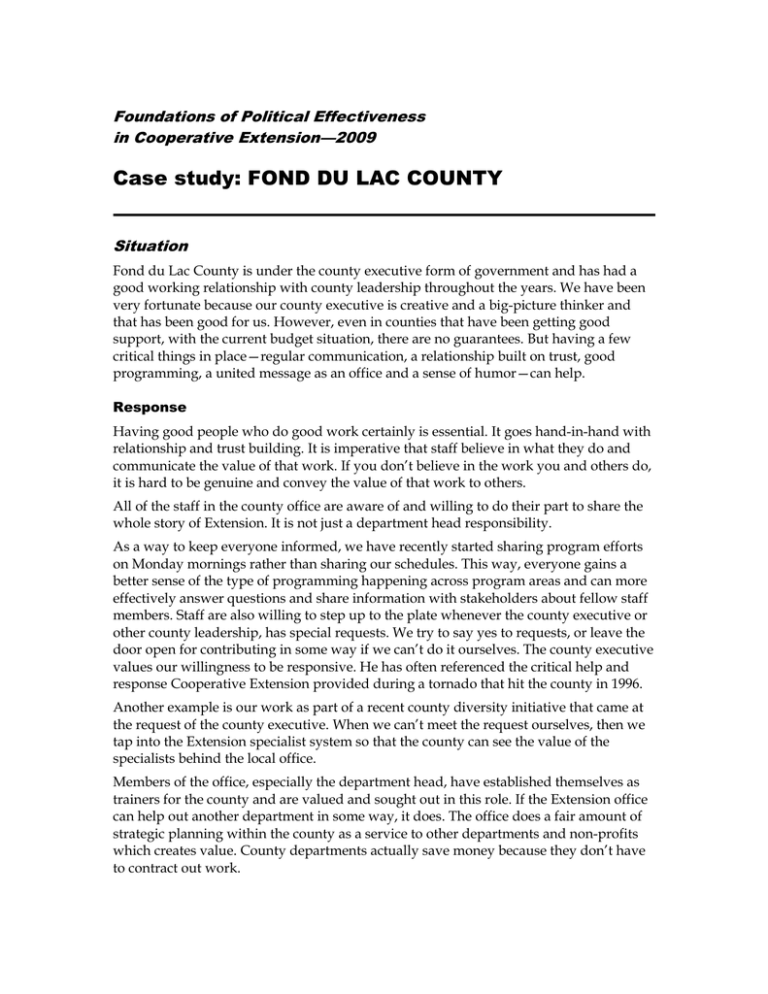Case study: FOND DU LAC COUNTY Foundations of Political Effectiveness
advertisement

Foundations of Political Effectiveness in Cooperative Extension—2009 Case study: FOND DU LAC COUNTY Situation Fond du Lac County is under the county executive form of government and has had a good working relationship with county leadership throughout the years. We have been very fortunate because our county executive is creative and a big-picture thinker and that has been good for us. However, even in counties that have been getting good support, with the current budget situation, there are no guarantees. But having a few critical things in place—regular communication, a relationship built on trust, good programming, a united message as an office and a sense of humor—can help. Response Having good people who do good work certainly is essential. It goes hand-in-hand with relationship and trust building. It is imperative that staff believe in what they do and communicate the value of that work. If you don’t believe in the work you and others do, it is hard to be genuine and convey the value of that work to others. All of the staff in the county office are aware of and willing to do their part to share the whole story of Extension. It is not just a department head responsibility. As a way to keep everyone informed, we have recently started sharing program efforts on Monday mornings rather than sharing our schedules. This way, everyone gains a better sense of the type of programming happening across program areas and can more effectively answer questions and share information with stakeholders about fellow staff members. Staff are also willing to step up to the plate whenever the county executive or other county leadership, has special requests. We try to say yes to requests, or leave the door open for contributing in some way if we can’t do it ourselves. The county executive values our willingness to be responsive. He has often referenced the critical help and response Cooperative Extension provided during a tornado that hit the county in 1996. Another example is our work as part of a recent county diversity initiative that came at the request of the county executive. When we can’t meet the request ourselves, then we tap into the Extension specialist system so that the county can see the value of the specialists behind the local office. Members of the office, especially the department head, have established themselves as trainers for the county and are valued and sought out in this role. If the Extension office can help out another department in some way, it does. The office does a fair amount of strategic planning within the county as a service to other departments and non-profits which creates value. County departments actually save money because they don’t have to contract out work. We are not asked as often as we might be; however we remind key leaders about ways we could assist in whatever issue or situation might be impacting county residents. We do so in both formal and informal ways. It takes all the staff pitching the resources of the entire office across all program areas. Inviting county officials to our programs also connects them to our work and helps them see our value. We need to remember, stakeholders can’t ask for Extension’s help if they don’t know what we have to offer or if we aren’t willing to explore new possibilities. Ultimately, success is built on good communication and good relationships. Honesty and straightforwardness are keys to building trust and strong relationships. The department head lives by this principle. She doesn’t try to hide things, pull any punches, or make a situation appear one way when it is something else. She believes in being up front and following through. The way to build strong relationships is to spend time getting to know people. The Extension office is not located in the county building. The Department Head makes a point to visit the city/county building and talk to people. Even when she could accomplish the task over the phone, she might still go in person, just to touch base in a personal way. It is also important to get to know some of the other important players, such as the finance director, and ask for their input as you work through issues. Successful support and good working relationships also depend on the players in county leadership positions—something over which you don’t have any control. As indicated earlier, our leadership in Fond du Lac County is great. Our county executive encourages department heads to do their jobs without micro-managing them. Just recently, a secretary from the Extension office transferred to another department and the county is in a hiring moratorium. After discussing possible scenarios with staff on how to approach this situation, the department head met with the county executive. The department head proposed different options to pursue related to work coverage in the absence of this position, with an option to review in six months. He appreciated the willingness to be flexible and for looking at other options, rather than just expecting to fill the position because it’s always been that way. You have to be willing to give in on some things and see things from another’s point of view. Thinking through what is a “win” for the office and a “win” for the county helps move things forward in a positive way. At the same time, try to leave room for revisiting or exploring other options at another time. I like to “plant seeds”—to ask about things even if they may not be possible at the time. This way, the possibility has been put on the table and is easier to come back to it sometime in the future. There will be times when there won’t be agreement about a situation. In that case, you should not be afraid to ask for a chance to try to prove the need (for example, for a position), seek additional information/clarification or enter into a conversation to explore other options regarding the request. Finally, humor is essential. There is a time and a place for formality but likewise a time and place for a little levity and humor. Being genuine and just “who you are” goes a long way in building good relationships. Outcomes The result of all of this is that the Extension office has enjoyed positive support for its budget year to year; it has new and improved office space (with active involvement in deciding what that space should look like); it has been able to fill all open educator positions; it regularly purchases and upgrades technology and other equipment; it has not been singled out for cuts, and there is support for professional development opportunities. The department head has just been asked to become a certified trainer in Myers-Briggs Type Indicator in order to provide training to other departments in the county—another indicator of the value that county leadership sees in having Extension faculty as part of the county team.
